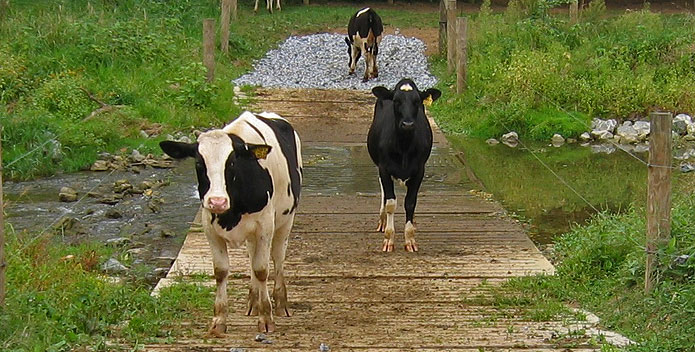CBF and partners work with farmers, renters, and landowners throughout the region to implement riparian forested buffers and install best management practices (BMPs) that will improve water quality and enhance farm profitability. This program encourages landowners to couple the U.S. Department of Agriculture’s (USDA) Conservation Reserve Enhancement Program (CREP) forested buffers with on-farm improvements that benefit water quality.
For every acre of riparian forested buffer installed, a landowner earns a "voucher" that financially assists landowners in the installation, planning, or design of on-farm best management practices (BMPs). Improvements that qualify for these vouchers include streambank fencing, rotational grazing practices, cover cropping, composting practices and equipment, to name a few.
Another outcome of this program is to provide, at no cost to the farmer, a new or updated Conservation and Nutrient Management Plan (CNMP). With a CNMP, a farmer is then eligible to apply for federal funding to assist with larger on-farm improvements such as manure storage facilities and concrete barnyards. The Buffer Bonus voucher can help with the share not covered by USDA.
Buffer Bonus Results
Since 2014, 63 farmers have participated in the CBF Buffer Bonus Program in Bradford, Centre, Clinton, Franklin, Juniata, Lancaster, Mifflin, Susquehanna, and Tioga Counties. Through the investment of $2.4 million with public partners like the PA Department of Environment Growing Greener Fund, National Fish and Wildlife Fund, and private partners like the Richard King Mellon Foundation, this program has resulted in 665 on-farm best management practices. In addition, nearly 53 miles and 465 acres of riparian forested buffers have been established along Pennsylvania streams and rivers, resulting in improved water quality and decreased loads of nitrogen, phosphorus, and sediment into the Bay.
"These conservation improvements are a win-win for both the farmer and local water quality," said Jennifer Johns, CBF Buffer Specialist in Bradford County. "While each project ultimately produces different results, we find that creating healthier living conditions for the livestock through the installation of conservation practices improves herd health and the farmer's bottom line."



